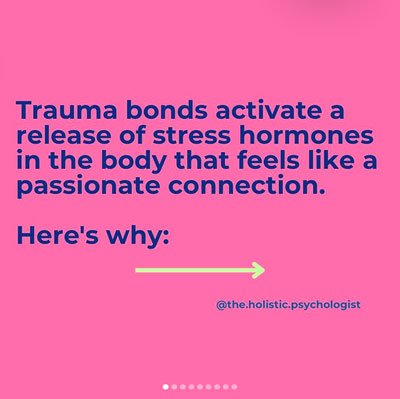I really resonate with one of psychologist Dr. Nicole LaPera’s latest Instagram posts. She writes about what makes trauma bonds so dang compelling to some of us. The first image in her post says “Trauma bonds activate a release of stress hormones in the body that feels like a passionate connection. Here’s why: —>” The subsequent images say:

“When our childhood was chaotic, unpredictable, or we experienced emotional neglect, we look at relationships as places to re-enact our original trauma wounds.
This is called repetition compulsion, or the subconscious desire to re-enact in order to heal.
In trauma bonds, one person takes on the role of wanting to be rescued.
The “Rescue Me” partner has created a fantasy illusion that someone can rescue them from life as they know it and finally meet all of their needs.
The illusion is created in childhood to escape the pain of abandonment, shame and rejection they experience from parent figures or close family members.
The “Rescue Me” partner is attracted to people who:
- Sell them the “romanticized” version of love through seduction, empty promises, or grand gestures.
- Are extremely jealous (insecure) who tend to be dominant or controlling.
- Are extremely charming, though their words rarely match their actions.
- Engage in intense drama cycles of conflict that often end in physical intimacy.
Physical intimacy becomes the substitute for emotional intimacy.
The “Rescue Me” partner finds these traits attractive because they are familiar (comfortable) experiences from childhood.
They perceive intense emotional reactivity as love or passion.
If a “Rescue Me” partner meets an emotionally healthy person, they’re often bored or uninterested.
With time, the “Rescue Me” partner becomes more and more resentful because:
- No partner can meet all of our needs.
- They choose partners who are impulsive, unpredictable, and emotionally unavailable (unsafe).
- They usually become obsessively focused on their partner and neglect other areas of life.
- The fantasy fades.
At this point, they will put more pressure on their partners, which will lead to their partner pulling away. This will bring on obsessive thinking about their partner.
Or, they will look for the next person they can create a new fantasy around.”
– Dr. Nicole LaPera, @the.holistic.psychologist
I personally relate to being a “Rescue Me” type of partner for much of my life. Even now, after doing so much internal work, I still find myself hoping to meet the “one” who can change everything for me.
After my last relationship, I did a lot of healing around “love addiction” and co-dependency. I had to change my whole concept of love and what it was supposed to look like. Focusing on myself, and becoming aware of my own body sensations, feelings, and needs, was key. Once I knew what my needs and desires actually were, I could either work on fulfilling them myself, rather than try to outsource that job to somebody else, or ask for help from someone who can help me with what I need.
Having awareness of your own psychological workings and beginning to know yourself on a deeper level is the first step to changing patterns that no longer serve. I’ve been reading Dr. LaPera’s new workbook How to Meet Your Self: The Workbook for Self-DIscovery and am finding it a wonderful guide for doing this kind of deep inner work.










0 Comments